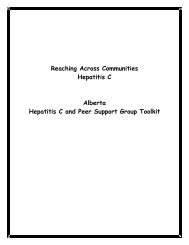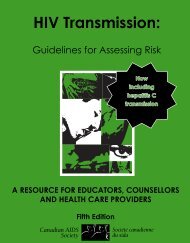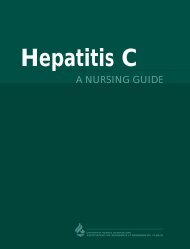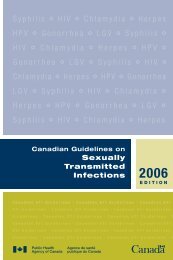A Guide to Primary Care of People with HIV/AIDS - Canadian Public ...
A Guide to Primary Care of People with HIV/AIDS - Canadian Public ...
A Guide to Primary Care of People with HIV/AIDS - Canadian Public ...
You also want an ePaper? Increase the reach of your titles
YUMPU automatically turns print PDFs into web optimized ePapers that Google loves.
A <strong>Guide</strong> <strong>to</strong> <strong>Primary</strong> <strong>Care</strong> <strong>of</strong> <strong>People</strong> <strong>with</strong> <strong>HIV</strong>/<strong>AIDS</strong><br />
Chapter 12: Family Planning and Pregnancy<br />
Where should prenatal exposure cases be<br />
reported?<br />
Cases <strong>of</strong> prenatal exposure should be reported <strong>to</strong> the<br />
Antiretroviral Pregnancy Registry. This registry collects<br />
anonymous observational data. The Registry can be<br />
contacted at:<br />
Antiretroviral Pregnancy Registry<br />
115 N. Third St., Suite 28401<br />
Wilming<strong>to</strong>n, NC 28401<br />
Tel: 800-258-4263<br />
FAX: 800-800-1052<br />
KEY POINTS<br />
All <strong>HIV</strong>-positive women <strong>of</strong> childbearing<br />
age should receive information about the<br />
impact <strong>of</strong> <strong>HIV</strong> on the course and outcome <strong>of</strong><br />
pregnancy, the impact <strong>of</strong> pregnancy on <strong>HIV</strong><br />
progression, and appropriate contraception<br />
<strong>to</strong> prevent unintended pregnancy.<br />
To assure early identification <strong>of</strong> pregnancy<br />
in women <strong>with</strong> <strong>HIV</strong> who are sexually active,<br />
pregnancy tests should be done whenever<br />
they have late or missed menses or other<br />
signs <strong>of</strong> possible pregnancy. Women<br />
<strong>with</strong> the potential <strong>of</strong> becoming pregnant<br />
should be tested before starting potentially<br />
tera<strong>to</strong>genic therapies such as efavirenz<br />
(EFV). Patients should be alerted on potential<br />
tera<strong>to</strong>genic effects on the fetus, and suitable<br />
contraception should be prescribed.<br />
12<br />
Contraceptive methods recommended for<br />
women <strong>with</strong> <strong>HIV</strong> include condoms, which<br />
also protect against STDs and prevent<br />
<strong>HIV</strong> transmission <strong>to</strong> their partners, and<br />
hormonal methods. The drug interactions<br />
between oral contraceptives and many<br />
drugs used in <strong>HIV</strong> disease make an<br />
additional means <strong>of</strong> contraception advisable<br />
in many cases. Spermicides and intrauterine<br />
devices are not recommended for use by<br />
<strong>HIV</strong>-infected women.<br />
<strong>HIV</strong> testing should be a routine part <strong>of</strong><br />
prenatal care for all women. <strong>HIV</strong> testing<br />
should be voluntary using the “opt out”<br />
method (the <strong>HIV</strong> test is part <strong>of</strong> routine<br />
bloodwork and the woman may opt <strong>to</strong><br />
refuse the test). Pre- and post-test <strong>HIV</strong><br />
counseling should be provided.<br />
All pregnant women infected <strong>with</strong> <strong>HIV</strong><br />
should receive antiretroviral therapy.<br />
Zidovudine monotherapy can be provided <strong>to</strong><br />
untreated pregnant women <strong>with</strong> a baseline<br />
viral load <strong>of</strong>

















